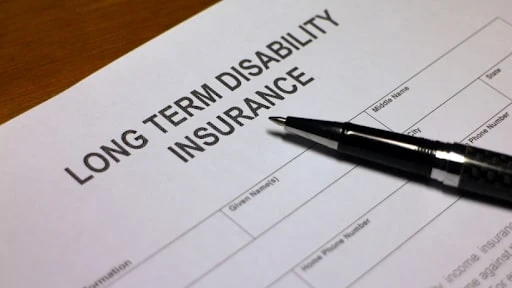
Long-Term Disability: Comprehensive Overview
Long-term disability (LTD) insurance, typically provided by employers or obtained individually, is designed to offer income protection if an employee cannot work due to a serious illness or injury.
If you receive your LTD policy from your employer, this coverage usually kicks in after short-term disability benefits end, often covering a significant portion of an employee’s salary. If you purchased a private LTD policy, benefits will start up after an elimination period, which can be one week to three months in general.
The duration of Long-term disability benefits can vary, often lasting until the individual can return to work, reaches retirement age, or for a set period defined in the policy.
Navigating the application process for LTD benefits requires understanding specific policy terms and providing adequate medical proof of disability.
At Aaron Engle Law, we guide clients through these intricate processes, ensuring they understand their rights and obligations under their LTD coverage.
What Happens to Long-term Disability if You Lose Your Job?
When an employee is terminated, the fate of their long-term disability (LTD) insurance often becomes a primary concern.
In most cases, if the employee is already receiving LTD benefits, these usually continue as per the terms of the policy, independent of employment status.
However, if the employee has not yet started receiving LTD benefits or is in the process of applying, losing the job can complicate matters. If your disability commenced while you were covered under the LTD policy, you should be eligible. If your LTD claim is approved, typically the premiums are waived due to your disability.
Employer-provided LTD policies typically cease with employment termination, meaning the employee may lose their eligibility to receive disability benefits.
It’s crucial to understand specific policy terms and whether portability or conversion options are available to continue coverage independently.
If you have a private disability policy, if you are current on your premiums, you should be eligible.
At Aaron Engle Law, we help clients navigate these complex scenarios, ensuring they understand their LTD benefits and rights following job loss.
How Does Long-Term Disability Work Through Employers?
Long-term disability (LTD) insurance through employers operates as a safety net for employees, providing financial assistance when they’re unable to work due to prolonged illness or injury.
Typically, these employer-provided plans require a waiting period, often following or concurrent with the expiration of short-term disability benefits.
Once this period elapses, the employee can apply for LTD benefits, which usually cover a portion of their regular salary, commonly between 50-70%.
The application process demands thorough medical documentation to prove the disability. Employer-based LTD policies differ in terms of benefit duration, which can range from a few years to retirement age, depending on the policy terms. Many policies limit coverage for certain medical conditions. For example, many LTD policies limit coverage for mental health conditions to 24 months.
Understanding these details is crucial for employees, and at Aaron Engle Law, we specialize in clarifying these aspects and assisting clients in leveraging their employer-provided LTD benefits effectively.
LTD Laws: Protecting Employees with Disability
Navigating the complexities of long-term disability (LTD) insurance involves not only understanding the insurance policy but also being aware of the legal protections in place for employees with disabilities. Two key federal laws provide crucial safeguards:
Americans With Disabilities Act (ADA)
The ADA prohibits discrimination against individuals with disabilities in all areas of public life, including employment.
It requires employers to provide reasonable accommodations to employees with disabilities unless doing so would cause significant difficulty or expense to the employer.
This act ensures that people with disabilities have the same rights and opportunities as everyone else, including maintaining employment while coping with a disability.
Family and Medical Leave Act (FMLA)
The FMLA entitles eligible employees to take unpaid, job-protected leave for specified family and medical reasons, with continuation of group health insurance coverage.
This includes serious health conditions that can cause long-term disability. Under FMLA, employees are entitled to 12 weeks of leave in 12 months, providing a buffer for those transitioning into LTD status.
At Aaron Engle Law, we help clients understand how these laws intersect with LTD benefits, ensuring their rights to medical treatment are protected while managing their disability.
Aaron Engle Law: Providing LTD Employee Protection
Navigating the complexities of what happens to long-term disability if you lose your job requires expert guidance and legal insight. At Aaron Engle Law, we specialize in protecting the rights of employees navigating the challenging terrain of LTD benefits.
Whether it’s understanding employer-provided LTD insurance, grappling with legalities post-job loss, or leveraging federal laws like the ADA and FMLA, our team offers comprehensive support.
If you’re facing uncertainties in your LTD benefits or employment status, let Aaron Engle Law be your advocate. Contact us today to ensure your rights are safeguarded, and your LTD benefits are secured.
